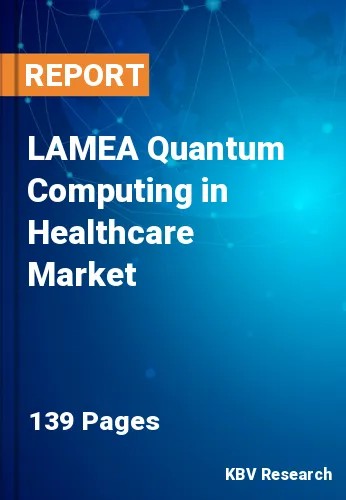The Latin America, Middle East and Africa Quantum Computing in Healthcare Market would witness market growth of 49.8% CAGR during the forecast period (2023-2030).
Large data quantities can be processed and analyzed by quantum computers much more quickly, which means they offer cutting-edge computing skills that can aid in finding solutions to challenging healthcare issues. This technology's development, usage, and market cover all facets of the hardware, software, and algorithms utilized in quantum computing, which was largely created for medical uses. Collaboration between healthcare providers, research institutions, and other stakeholders is essential in order to fully leverage the promise of quantum computing to improve healthcare outcomes, efficacy, and innovation.
This industry involves developing and marketing hardware for quantum computation, such as quantum processors and qubits, as well as computation-specific algorithms and specialized software. It entails consulting services, R&D projects, and incorporating quantum computing capabilities into current medical infrastructure and procedures. By simulating chemical events and, more precisely, foreseeing drug-target interactions, quantum computing speeds up the pursuit of new medications.
Costs can be decreased, medication candidates are chosen more carefully, and the creation of specialized treatments is improved. By increasing image reconstruction and analysis, quantum computing can enhance medical imaging systems like CT and MRI scans. It can expedite and enhance picture processing, facilitating diagnosis and identifying early illness. Large volumes of genomic data may now be examined more quickly owing to quantum computing, opening the door for personalized treatment approaches. It can help in genome sequencing, finding disease-related genetic markers, as well as facilitating the creation of individualized treatment programs based on a person's genetic profile.
The high disease burden on the regional nations is driving technological advancements in healthcare. Chronic diseases are widely prevalent in South Africa. Nearly 8 million people in the nation live with HIV, necessitating lifetime Anti-Retroviral Therapy (ART) and a typical lifespan if they adhere to their prescribed regimen. The desire for quantum computing solutions may be fueled by the region's particular healthcare requirements and concerns. For instance, the region struggles with disease diagnosis and treatment, medication discovery, genetic analysis, and the efficient use of healthcare resources. There would be a greater need for quantum computing technologies in the healthcare industry if they could address these problems. The demand for cutting-edge technology like quantum computing could grow as the region works to improve its healthcare infrastructure and services.
The Brazil market dominated the LAMEA Quantum Computing in Healthcare Market by Country in 2022, and would continue to be a dominant market till 2030; thereby, achieving a market value of $11,294.8 Thousands by 2030. The Argentina market is exhibiting a CAGR of 50.7% during (2023 - 2030). Additionally, The UAE market would showcase a CAGR of 49.4% during (2023 - 2030).
Based on Deployment, the market is segmented into On-premise, and Cloud. Based on Component, the market is segmented into Hardware, Software, and Services. Based on Technology, the market is segmented into Superconducting Qubits, Trapped Ions, Quantum Annealing, and Others. Based on Application, the market is segmented into Drug Discovery & Development, Medical Diagnostics, Genomics & Precision Medicine, Radiotherapy, Risk Analysis, and Others. Based on End User, the market is segmented into Pharmaceutical & Biopharmaceutical Companies, Labs & Research Institutes, Healthcare Providers, and Healthcare Payers. Based on countries, the market is segmented into Brazil, Argentina, UAE, Saudi Arabia, South Africa, Nigeria, and Rest of LAMEA.
Free Valuable Insights: The Worldwide Quantum Computing in Healthcare Market is Projected to reach USD 1 Billion by 2030, at a CAGR of 45.4%
The market research report covers the analysis of key stake holders of the market. Key companies profiled in the report include IBM Corporation, RIGETTI COMPUTING, INC., ID Quantique SA, D-Wave Systems Inc., Google LLC (Alphabet Inc.), Protiviti Inc. (ROBERT HALF INTERNATIONAL INC.), Deloitte Touche Tohmatsu Limited, Accenture PLC and Atos Group.
By Deployment
By Component
By Technology
By Application
By End User
By Country
Our team of dedicated experts can provide you with attractive expansion opportunities for your business.

